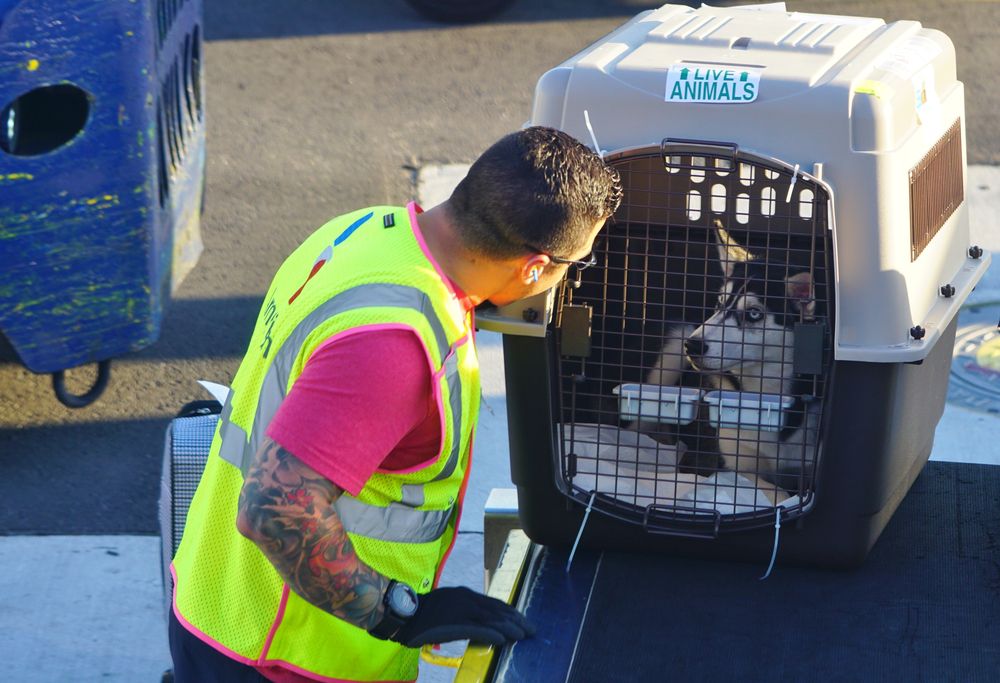If you plan to travel by air, your pet will need to be examined by a licensed and certified veterinarian
![]()

A baggage handler takes care of a pet dog in a crate.
Photo courtesy airpetsinternational.com
By Dr. Jeanne Haggerty-Arcay

Dr. Jeanne Haggerty-Arcay
Now that COVID-19 restrictions have eased and the world is trying to resume life as it was pre-COVID, travel plans for the summer are on the rise. Many people have apprehensions about leaving their pet at home while they are on vacation and prefer to have the pet travel with them. In making a good decision regarding pet travel there are a number of considerations.
The first and most important decision involves the well-being of your pet.
If you have a pet who is not acclimated to traveling, suffers from anxiety when leaving the home or is not used to being in a crate, you may want to reconsider traveling with your pet and look into other options, such as reliable pet-sitters and boarding facilities.
Airline Travel
The requirements for air travel with a pet depend on both the destination as well as the specific airline.
- Certificate of Veterinary Inspection (Health Certificate): If you plan to travel by air, your pet will need to be examined by a licensed and certified veterinarian prior to travel to ensure that he/she is healthy enough for travel and not suffering from any potentially contagious disease.
 Acclimation certificate: An acclimation certificate may be required, especially for pets who will be traveling in the cargo hold. This is issued by a veterinarian and certifies that the pet is able to withstand specific low and high temperatures for a specified amount of time. Certain health conditions may make your pet ineligible for this certification.
Acclimation certificate: An acclimation certificate may be required, especially for pets who will be traveling in the cargo hold. This is issued by a veterinarian and certifies that the pet is able to withstand specific low and high temperatures for a specified amount of time. Certain health conditions may make your pet ineligible for this certification.- Crate: Pets traveling need to be comfortable being in a crate for a lengthy period of time. Airlines often have crate specifications required for pets traveling in the cabin that may specify the type of crate and specific dimensions. For both cabin and cargo travel, the crate should be large enough for the pet to stand, have a waterproof floor with plenty of absorbent padding and should have adequate ventilation. If your pet is not used to being in a crate, you may want to either start that process of crate training several months prior to travel or consider leaving them at home. Crate travel for a pet who is not acclimated to being in a crate can be very stressful and lead to significant health issues.
- Rabies Vaccination: Rabies vaccination is almost universally required for air travel for any pet old enough to receive a vaccine. The specific requirements are determined by the destination. Rabies titers are not an acceptable replacement for rabies vaccination, although titers may be required in addition to vaccination.
- Additional Requirements: Certain destinations within the U.S. (especially Hawaii) as well as other countries may have very specific protocols that need to be followed in order for a pet to enter that region. Additional vaccines, titers and tick treatment are some of the more common additional requirements. Eligibility to travel to certain destinations may take several months to accomplish. Become aware of the destination’s requirement and make plans far in advance of the travel date.
- Sedatives: In general, it is preferred to travel with a pet who has not received sedation. However, there are cases where sedation would be recommended. Your veterinarian may prescribe sedation in order to reduce anxiety during travel.
- Short-Nosed Dogs: Bulldogs and other short-nosed dogs (Frenchies, Boston terriers) may not be suitable to travel due to common breathing issues and temperature intolerance.
Car Travel
Even when traveling by car, your pet may be required to have a Certificate of Veterinary Inspection or Health Certificate.
Your pet should be used to traveling in the car before embarking on a long trip and you should plan on stopping every two to three hours in order to give them a little walk. Pets should not travel on the driver’s lap nor in the back of a pickup truck unless in a secured crate.
What to bring/have:
- All the required documents and a Rabies Certificate
- A suitable crate
- Your pet should be wearing a collar with updated contact information
- Consider having your pet microchipped
- All necessary medication to last the duration of the trip
- Medical records if your pet suffers from any chronic health conditions
- Ensure that your destination is pet-friendly and will allow your pet to stay
- Toys
- Food & water dishes
- Your own food as well as water if traveling by car
Traveling with pets has become increasingly more commonplace. Make sure to plan well in advance in order to meet the eligibility requirements and ensure that you have a pet who is suitable to be traveling.






